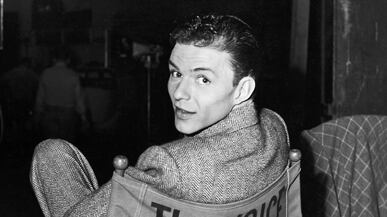Frank Sinatra fooled a lot of the people a lot of the time, but he couldn’t fool my Aunt Louise. Despite the lasting image of Sinatra wannabe Al Martino crooning Italian standards in The Godfather—may Mario Puzzo rot in hell—Frank never sang Italian songs. She would forgive him for leaving Nancy—what Italian man could resist Ava Gardner?—and she didn’t take too seriously the stories in the newspapers about him punching out a columnist or some other pezzonovante. What she couldn’t get past was that unlike Perry Como, Vic Damone, Julius La Rosa, Jerry Vale, Dean Martin, Martino, and other singers she loved, all chronicled in Mark Rotella’s hugely entertaining Amore, The Story of Italian American Song, Sinatra avoided the music of his parents’ generation in favor of Cole Porter, Rodgers and Hart, and Johnny Mercer. (He didn’t even sing an Italian song when performing for the prime minister of Italy at the White House in 1973.)
For the millions of children of Italian-American immigrants, Sinatra was a door to American culture; to millions of other Americans he was a window back into Italian-American genius—and to say genius is not hyperbole. Italians gave the world grand opera, and in Sinatra, Italian culture gave the world the foremost craftsman of popular song. As the consummate Sinatra fan, Wilfrid Sheed, put it, Sinatra became “a sort of one-man bureau of standards... If he is remembered for nothing else, ‘The Man Who Saved the Standards’ would not be the worst epithet a man could have.”
Neither would “The Voice,” which, not coincidentally, is the title of James Kaplan’s massive new biography.
Actually, Frank: The Voice isn’t a full biography, but instead uses up a staggering 750 pages just to take us to 1954, when winning the Academy Award for Best Supporting Actor for his role in From Here to Eternity saved Sinatra’s career. Kaplan dispenses with the horse’s head in the mogul’s bed nonsense about how Sinatra got the role: He campaigned producer Harry Cohn relentlessly—begging, pleading and finally taking the part for a pittance. But if the mob didn’t help Frank get the role of Maggio, he still had enough paisans in La Famiglia to fill a dozen pulp novels, or in this case, several hundred pages of a book.
At the least, Sinatra’s infamous trip to Havana in 1947, where he served as a bagman for the father of the modern mob, Lucky Luciano, would make a good movie. During Estes Kefauver’s congressional investigation into the Mafia, lawyer Joseph Nellis produced photographs of Sinatra with Luciano and asked him how well he knew the most powerful mob figure America ever produced. Frank replied, “That name is familiar.”
Gallery: Frank Sinatra’s Life and Loves

As a compendium of scandals and affairs of our most famous entertainer, The Voice doesn’t add much to Kitty Kelley’s notorious 1986 tell-all, His Way. How many times can you hear the story of Frank and Ava Gardner shooting at traffic signs in a small California town, or which co-star Sinatra nailed (most of them). To his credit, Kaplan doesn’t waste our time with fancy explanations for Sinatra’s sybaritic behavior: “There was no deep psychological underpinning to this: It was simply that the more famous Frank Sinatra got, the more women there were who wanted to go to bed with him, and it was hard not to oblige as many of them as possible.” Just about every year, including those he was married to Nancy, was a very good year. The real problem is that the names and faces begin to blur in the reader’s memory (as indeed they must have started to blur in Sinatra’s own).
Kaplan errs in not taking Sinatra, the actor, seriously enough. After all, as Sheed noted, “It is quaint to think of our greatest singer being saved by a movie in which he doesn’t sing. The talent that brought you such gems as Ship Ahoy and The Kissing Bandit saved the master’s bacon back in 1953.” The Voice has some great stuff I’ve never read before on Sinatra’s friendship with Montgomery Clift and how Clift helped him prepare for From Here to Eternity. But it would have been nice to know if their relationship continued and what Sinatra’s reaction was when it was revealed that Clift was gay. (Surely Sinatra did not know this when they were making the film?)
How good an actor was Frank? In truth, most of his films were either mediocre or downright awful. How a man who invested such care to the craft of singing could have been so careless in his film career is a mystery. It’s also a mystery as to how a man who was involved in so many awful films could have given so many superb performances. But in many of them—including his amiable psychotic assassin in Suddenly (1954), the alienated veteran in Some Came Running (1958), and, in his best film after From Here to Eternity, a brain-washed former POW in John Frankenheimer's eerie and exhilarating The Manchurian Candidate—Sinatra was wonderfully unaffected, displaying a natural, almost modest quality in which he wasn't afraid to reveal weakness or doubt or despair—something very close to his finest performances in the recording studio.
His best work was probably in Otto Preminger's The Man With the Golden Arm (1955). As a drug-addicted poker dealer, his performance was, in the words of Pauline Kael, “Rhythmic, tense, and instinctive, yet beautifully controlled, and of course he has a performer’s presence.”

Sinatra the movie star, though, would never have been if Sinatra the singer hadn’t existed in the first place. Through more than six decades, he ignored every popular trend that came along—except, perhaps, for a couple of dismissable forays into Rod “Listen to the Warm” McKuen and Paul Simon’s “Mrs. Robinson” (“The PTA, Mrs. Robinson, won’t OK the way you do your thing—ring-a-ding-ding”)—and still stayed popular. More than that, he has stayed contemporary.
In Get Him to The Greek, Russell Brand’s rocker, Aldous Snow, fantasizes, “In a previous life, I was Frank Sinatra. Even though he was still alive when I was born.” In his song “Empire State of Mind,” Jay-Z tells us, “I’m the new Sinatra.” Well, we’ll check back around 2060 and see.
As for Aunt Louise, Frank finally got through to her. The breakthrough was his masterpiece, September of My Years, released 35 years ago this month, which included not one Italian-American tune. But every song spoke to her own experiences in a lifetime of love and loss. She would nod and smile as he sang, in the preface to Kurt Weill’s “September Song,” of the girl who once resisted him, “As time came around, she came my way.” And, as time came around, my Aunt Louise came his way as well. When, at age 92, she finally had to leave the house she had lived in for nearly 70 years and give in to assisted living, she left her Sinatra records with for safekeeping. Every year or so, when nothing else will suffice, in the wee small hours I pull them out of their sleeves and play them, not because they are nostalgic but because they are now.
My guess is that in 2060 the new Sinatra will still be the old one. If he can win over his toughest critic, Aunt Louise, why could future generations resist him?
Plus: Check out Book Beast, for more news on hot titles and authors and excerpts from the latest books.
Allen Barra writes about sports for the Wall Street Journal and the Village Voice. He also writes about books for Salon.com, Bookforum, and the Washington Post. His latest book is Yogi Berra, Eternal Yankee.






